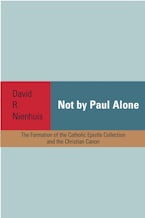David Nienhuis very convincingly puts the letter of James into a second century context by looking for semantic, theological and historical links to the other Catholic Epistles and to an impressive amount of literary sources from the time. By doing so, he is able to explain the way of receiving and understanding the message of the 'Pillar Apostles' from the beginnings of Christianity in a second century milieu when different Christian groups and communities had to develop their identity in opposition to and competition with 'Marcionite' groups or tendencies. Even for those who may disagree with his main thesis of a second century origin of the letter of James, David Nienhuis raises many thoughtful points to be considered more thoroughly.
~Karl Wilhelm-Niebuhr, Dean of the School of Theology, Friedrich-Schiller Universität Jena
This novel resolution to the puzzle that is the Book of James is full of instructive observations. Its case for a second-century dating of James is formidable, and its thesis about James' role in the formation of the New Testament canon attractive. Nienhuis has given us a thoroughly enjoyable book of meticulous scholarship whose implications for the study of early Christianity are broad.
~Dale C. Allison Jr., Errett M. Grable Professor of New Testament Exegesis and Early Christianity, Pittsburgh Theological Seminary
This book makes a brilliant and original and convincing contribution to the current attempt to rethink the relationship between text and community, scripture and church.
~Francis Watson, Kirby Laing Chair in New Testament, University of Aberdeen
Well written, scholarly, and well organized, this book provides new insight into an often-overlooked part of New Testament study... Highly recommended.
~CHOICE
Nienhuis provides a cogent and convincing interpretation of the canonical function of the Epistle of James as the head writing of the Catholic Epistles.
~Russell B. Sisson, Biblica

